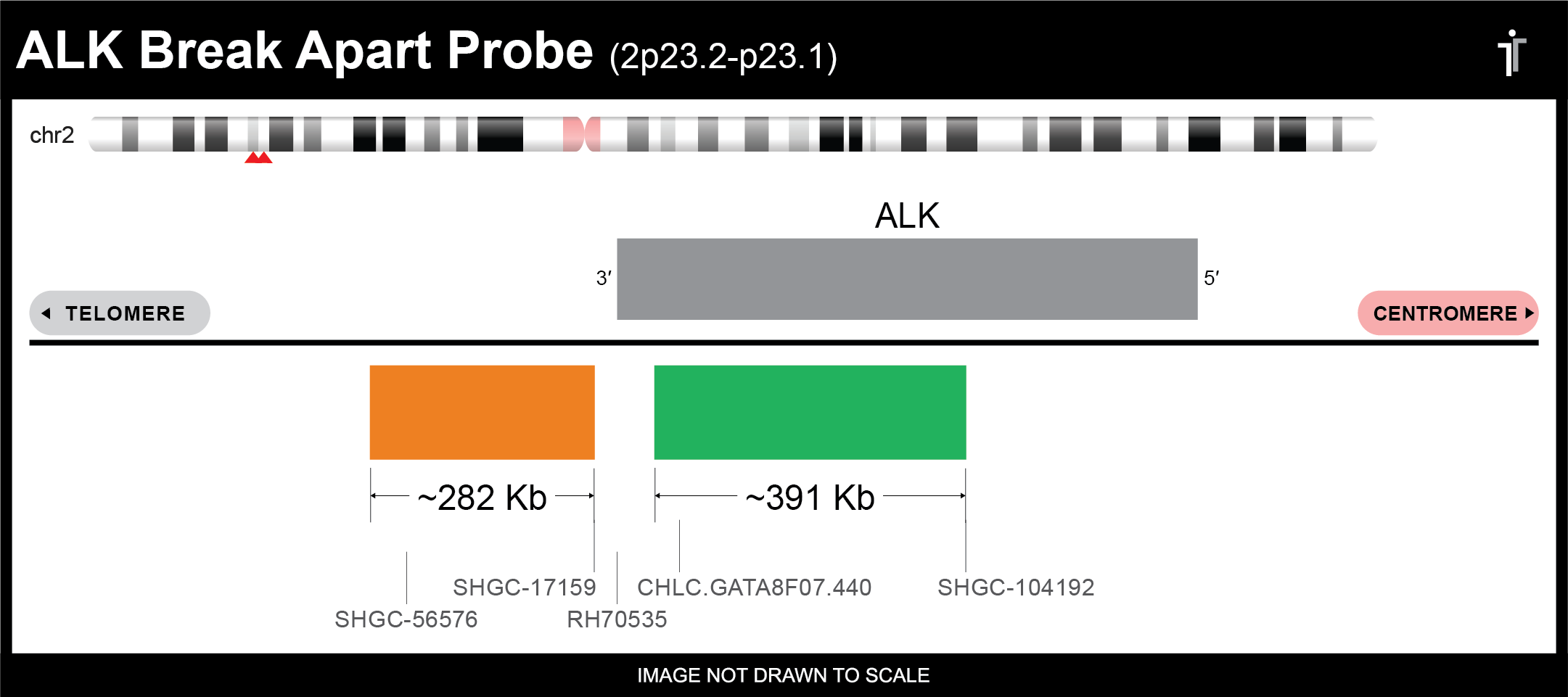ALK Break Apart FISH Probe
Our ALK break apart probe is designed to detect ALK translocations. The probe comes labeled in orange and green, but can be customized to meet your needs.
Gene Background: ALK encodes a tyrosine kinase receptor which plays a crucial role in intracellular signal transduction, allowing for cell growth and differentiation.1 Aberrations in ALK, especially translocations, have been found to play a significant role in the development of over 20 different types of cancers, especially lung and lymph.2 Approximately 3-5% of non-small cell lung cancer (NSCLC) cases harbor ALK translocations.3 These rearrangments most frequently occur via fusion of the 3’-portion of ALK, encoding its oncogenic kinase domain, with the 5’-portion of a partner gene, putting ALK under control of the partner’s promoter.2 ALK’s most frequent fusion partner in NSCLC is EML4, but over 30 different fusion genes have been identified, albeit in lower frequencies than EML4, in tumors of ALK-associated cancers.4 NSCLC patients with ALK translocations are typically younger women with no smoking history, and the most frequent tumor pathological type is adenocarcinoma.4

** This product is for in vitro and research use only. This product is not intended for diagnostic use.

| SKU | Test Kits | Buffer | Dye Color | Order Now |
|---|---|---|---|---|
| ALKBA-20-ORGR (Standard Design) | 20 (40 μL) | 200 μL |


|
|
| ALKBA-20-REGR | 20 (40 μL) | 200 μL |


|
Gene Summary
This gene encodes a receptor tyrosine kinase, which belongs to the insulin receptor superfamily. This protein comprises an extracellular domain, an hydrophobic stretch corresponding to a single pass transmembrane region, and an intracellular kinase domain. It plays an important role in the development of the brain and exerts its effects on specific neurons in the nervous system. This gene has been found to be rearranged, mutated, or amplified in a series of tumours including anaplastic large cell lymphomas, neuroblastoma, and non-small cell lung cancer. The chromosomal rearrangements are the most common genetic alterations in this gene, which result in creation of multiple fusion genes in tumourigenesis, including ALK (chromosome 2)/EML4 (chromosome 2), ALK/RANBP2 (chromosome 2), ALK/ATIC (chromosome 2), ALK/TFG (chromosome 3), ALK/NPM1 (chromosome 5), ALK/SQSTM1 (chromosome 5), ALK/KIF5B (chromosome 10), ALK/CLTC (chromosome 17), ALK/TPM4 (chromosome 19), and ALK/MSN (chromosome X).[provided by RefSeq, Jan 2011]
Gene Details
Gene Symbol: ALK
Gene Name: ALK Receptor Tyrosine Kinase
Chromosome: CHR2: 29415639-30144477
Locus: 2p23.2-p23.1
FISH Probe Protocols
| Protocol, Procedure, or Form Name | Last Modified | Download |
|---|